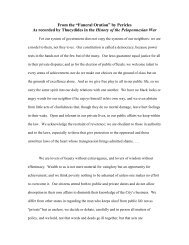Rousseau_contrat-social
Create successful ePaper yourself
Turn your PDF publications into a flip-book with our unique Google optimized e-Paper software.
Again, every malefactor, by attacking <strong>social</strong> rights, becomes on forfeit<br />
a rebel and a traitor to his country; by violating its laws be ceases to<br />
be a member of it; he even makes war upon it. In such a case the<br />
preservation of the State is inconsistent with his own, and one or the<br />
other must perish; in putting the guilty to death, we slay not so much<br />
the citizen as an enemy. The trial and the judgment are the proofs that<br />
he has broken the <strong>social</strong> treaty, and is in consequence no longer a<br />
member of the State. Since, then, he has recognised himself to be such<br />
by living there, he must be removed by exile as a violator of the<br />
compact, or by death as a public enemy; for such an enemy is not a moral<br />
person, but merely a man; and in such a case the right of war is to kill<br />
the vanquished.<br />
But, it will be said, the condemnation of a criminal is a particular<br />
act. I admit it: but such condemnation is not a function of the<br />
Sovereign; it is a right the Sovereign can confer without being able<br />
itself to exert it. All my ideas are consistent, but I cannot expound<br />
them all at once.<br />
We may add that frequent punishments are always a sign of weakness or<br />
remissness on the part of the government. There is not a single ill-doer<br />
who could not be turned to some good. The State has no right to put to<br />
death, even for the sake of making an example, any one whom it can leave<br />
alive without danger.<br />
The right of pardoning or exempting the guilty from a penalty imposed by<br />
the law and pronounced by the judge belongs only to the authority which<br />
is superior to both judge and law, i.e., the Sovereign; each its right<br />
in this matter is far from clear, and the cases for exercising it are<br />
extremely rare. In a well-governed State, there are few punishments, not<br />
because there are many pardons, but because criminals are rare; it is<br />
when a State is in decay that the multitude of crimes is a guarantee of<br />
impunity. Under the Roman Republic, neither the Senate nor the Consuls<br />
ever attempted to pardon; even the people never did so, though it<br />
sometimes revoked its own decision. Frequent pardons mean that crime<br />
will soon need them no longer, and no one can help seeing whither that<br />
26











